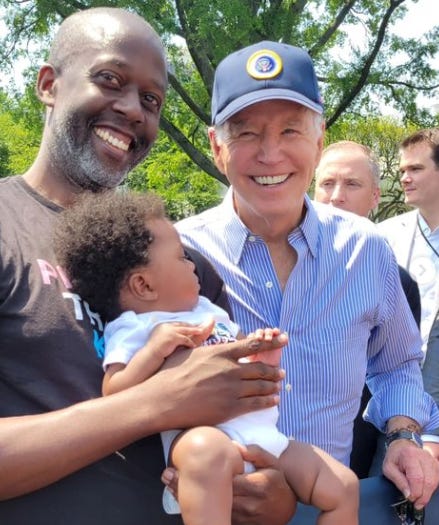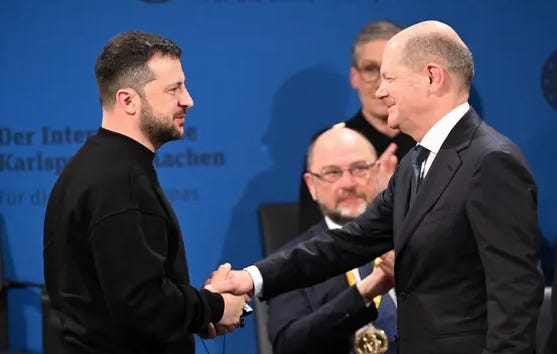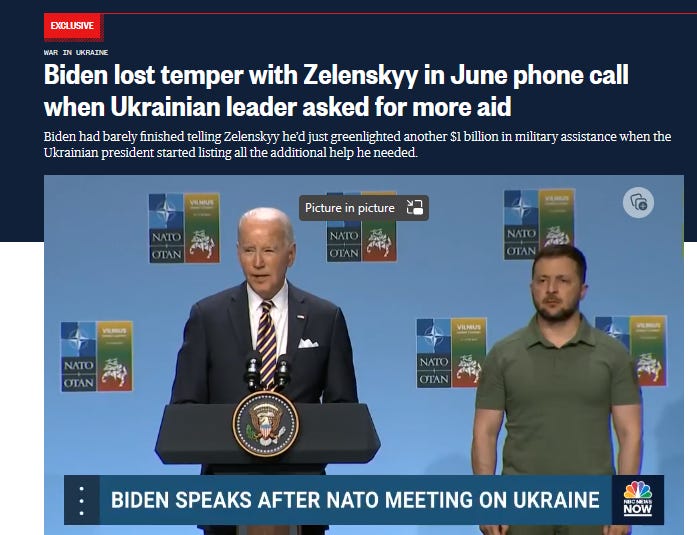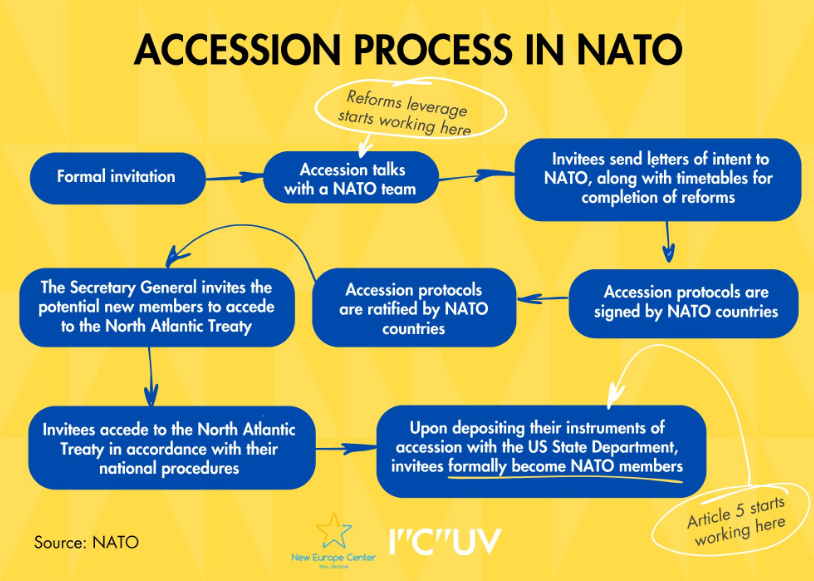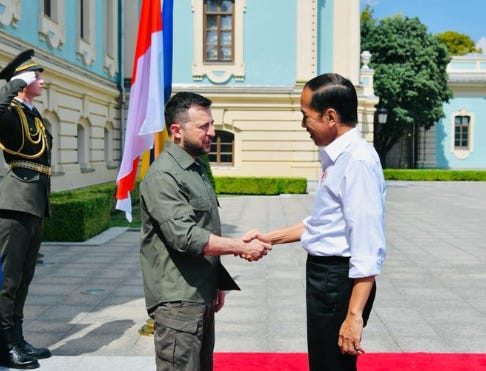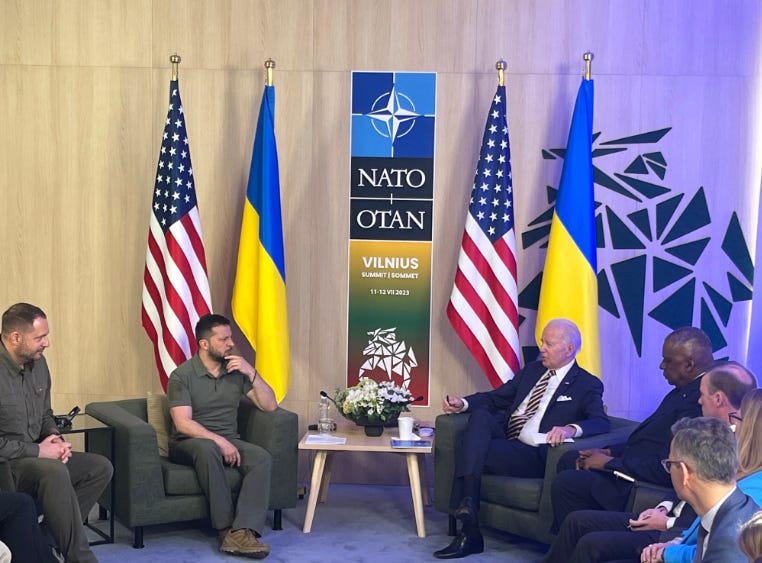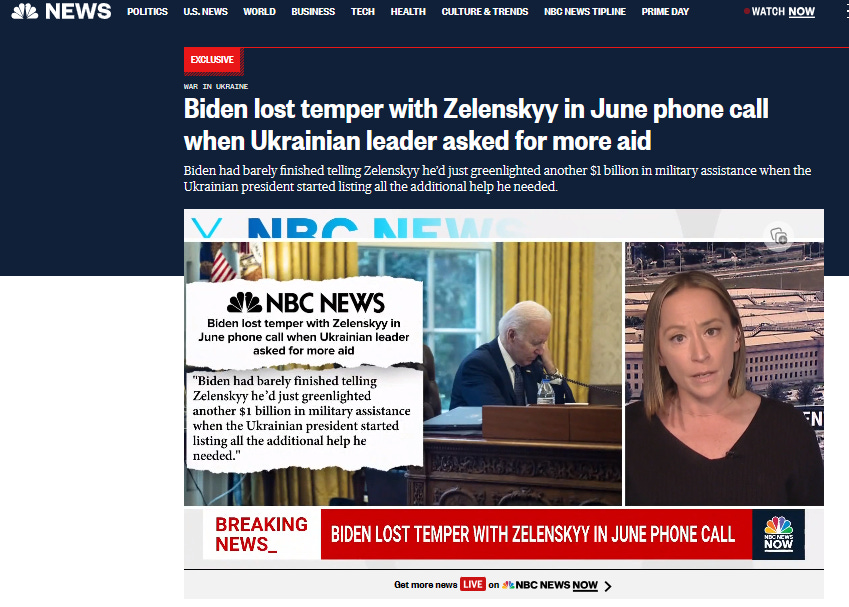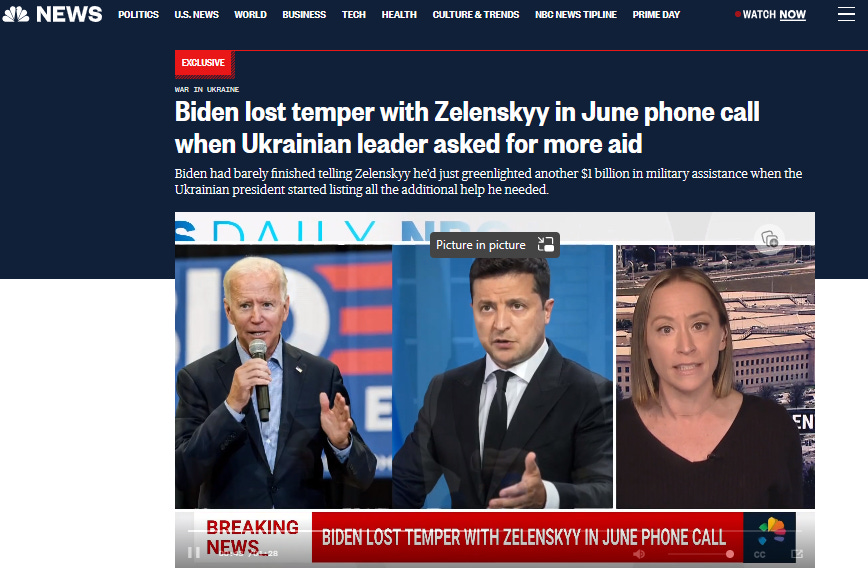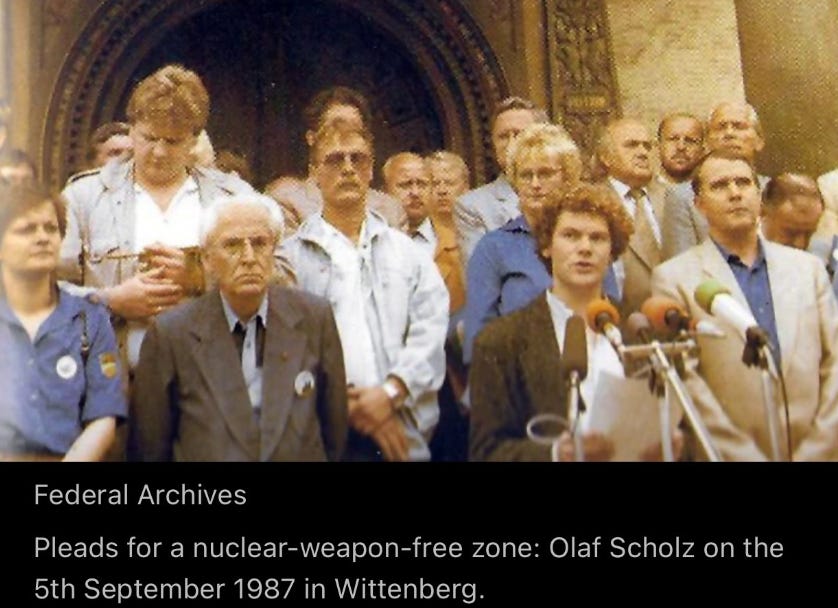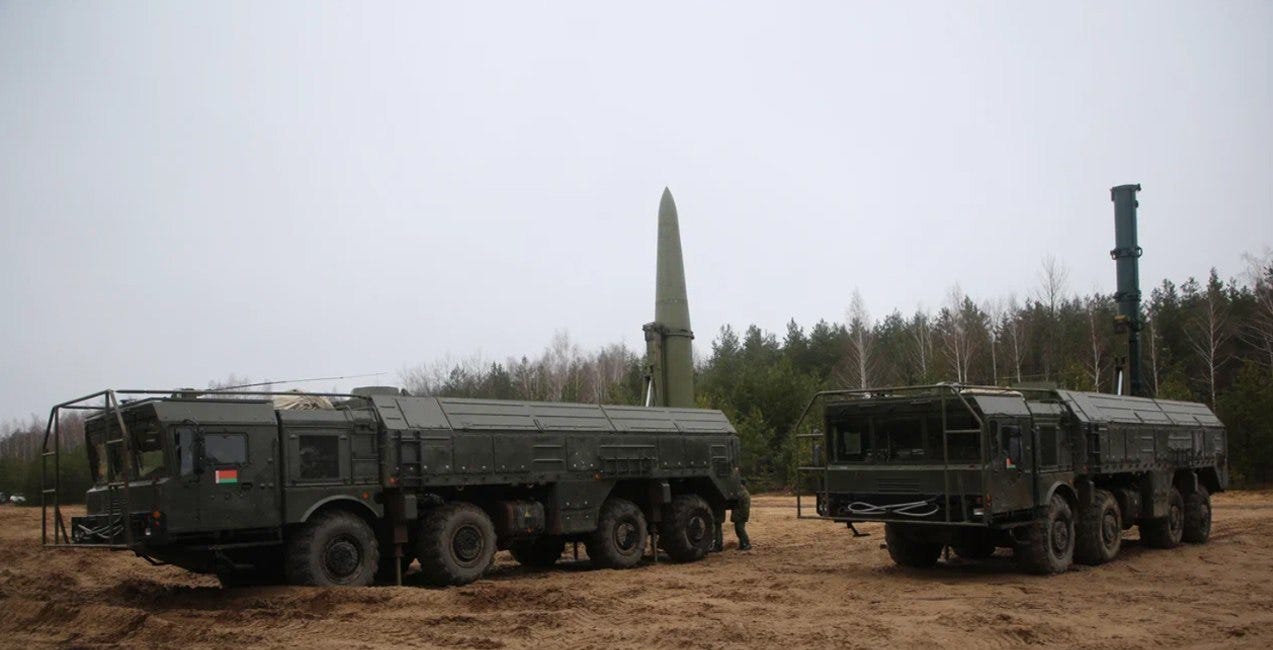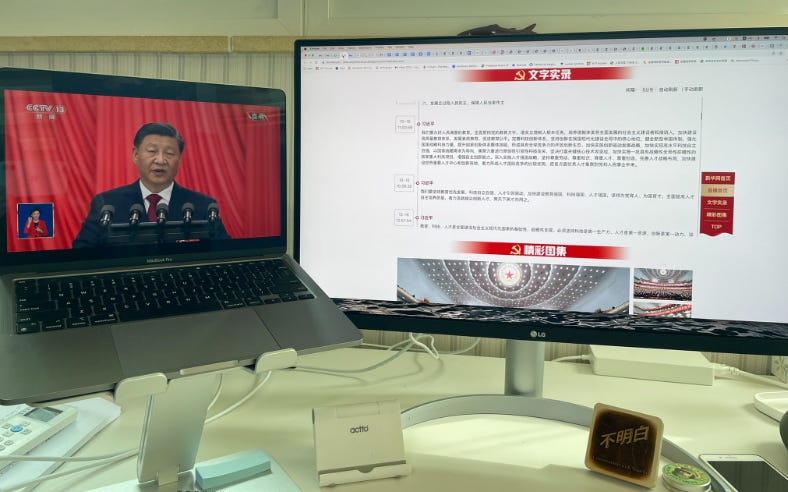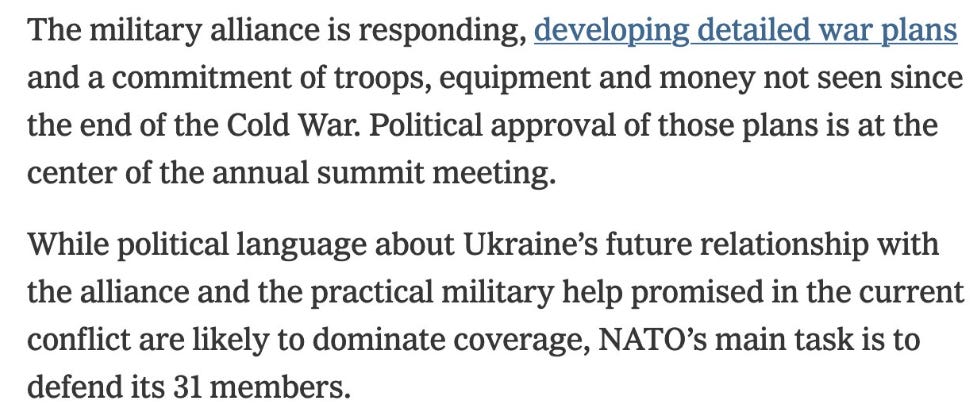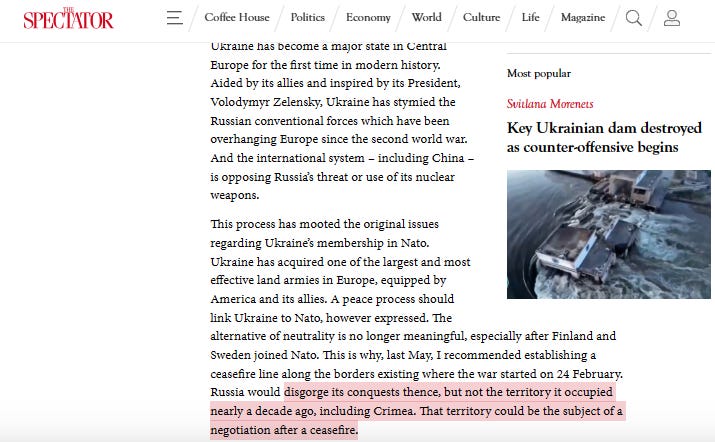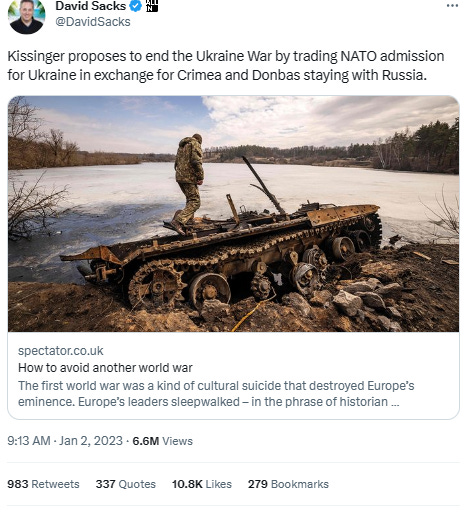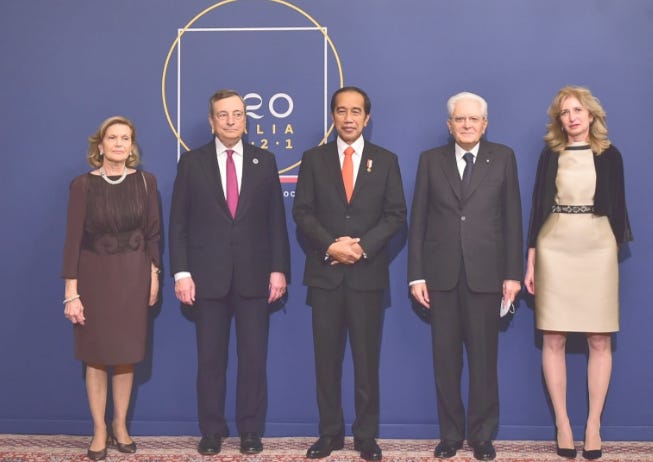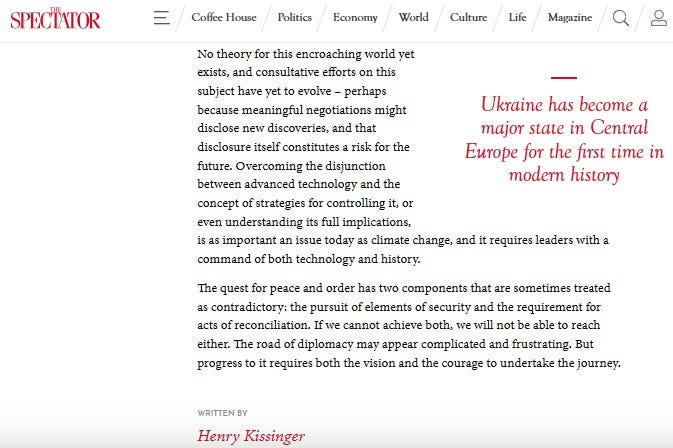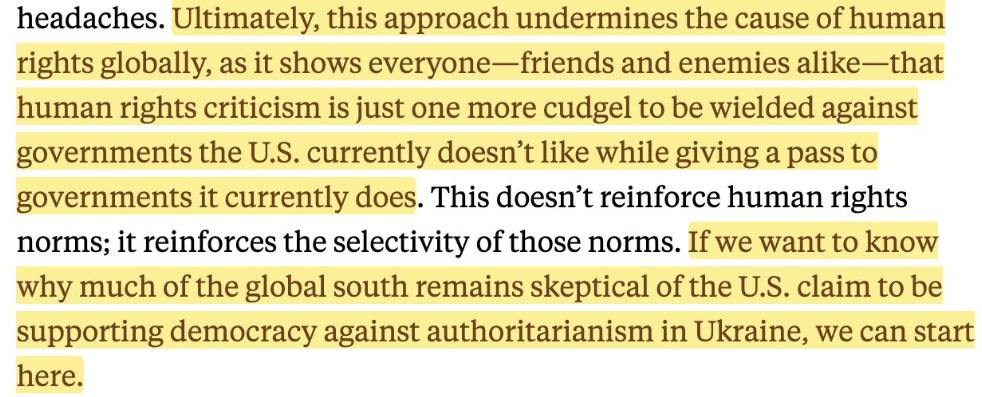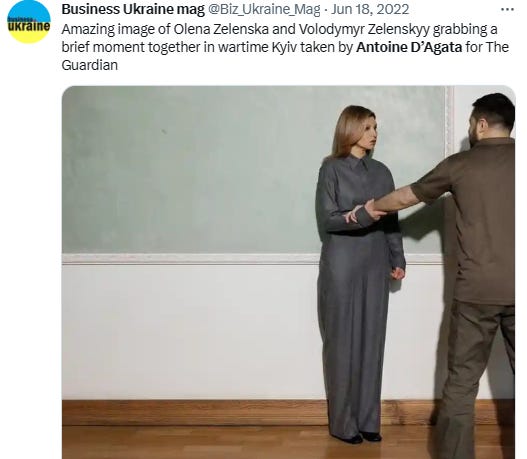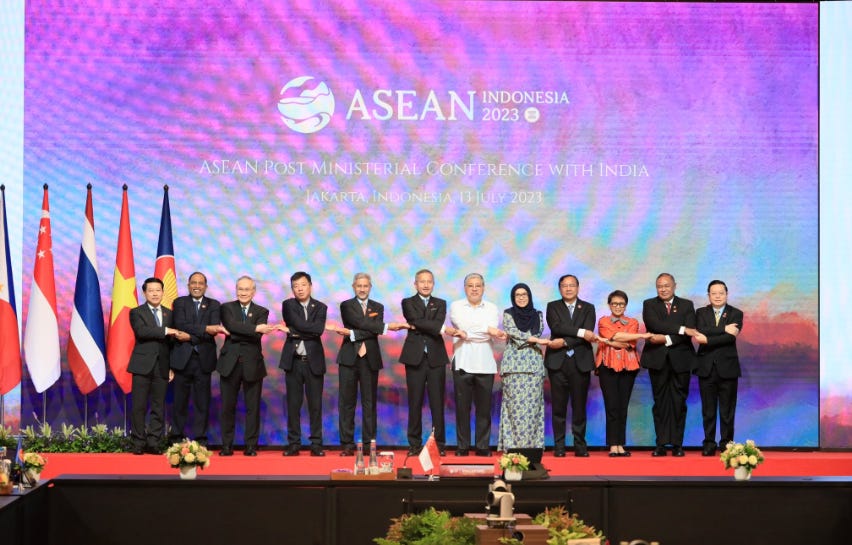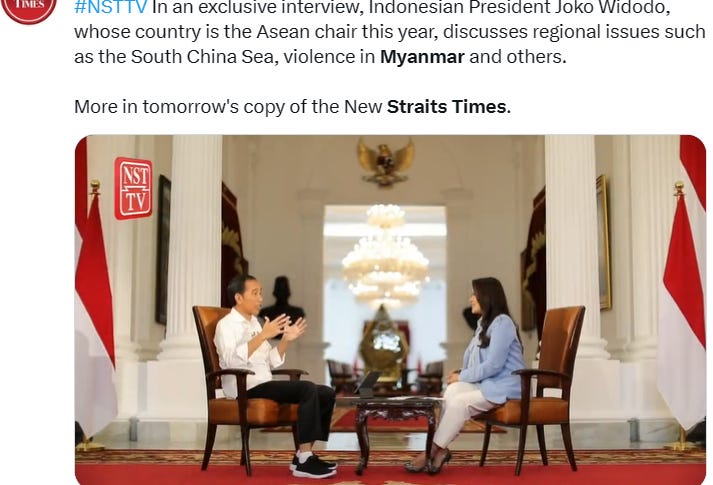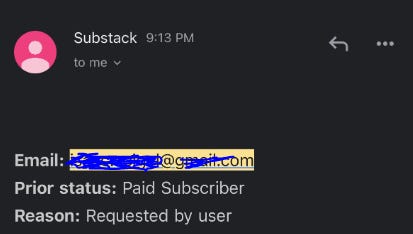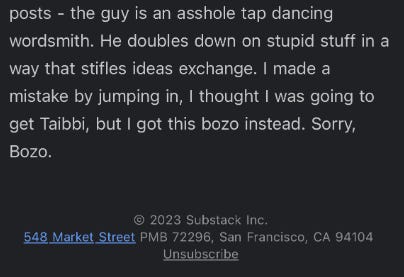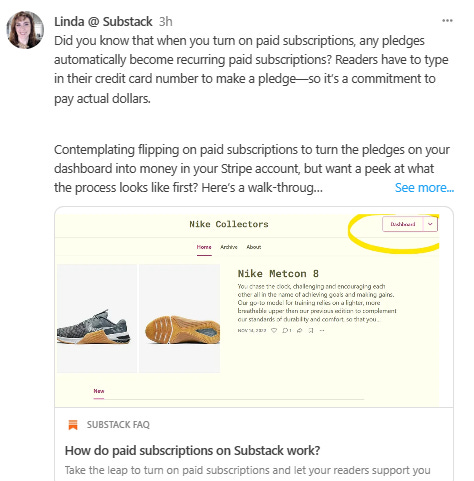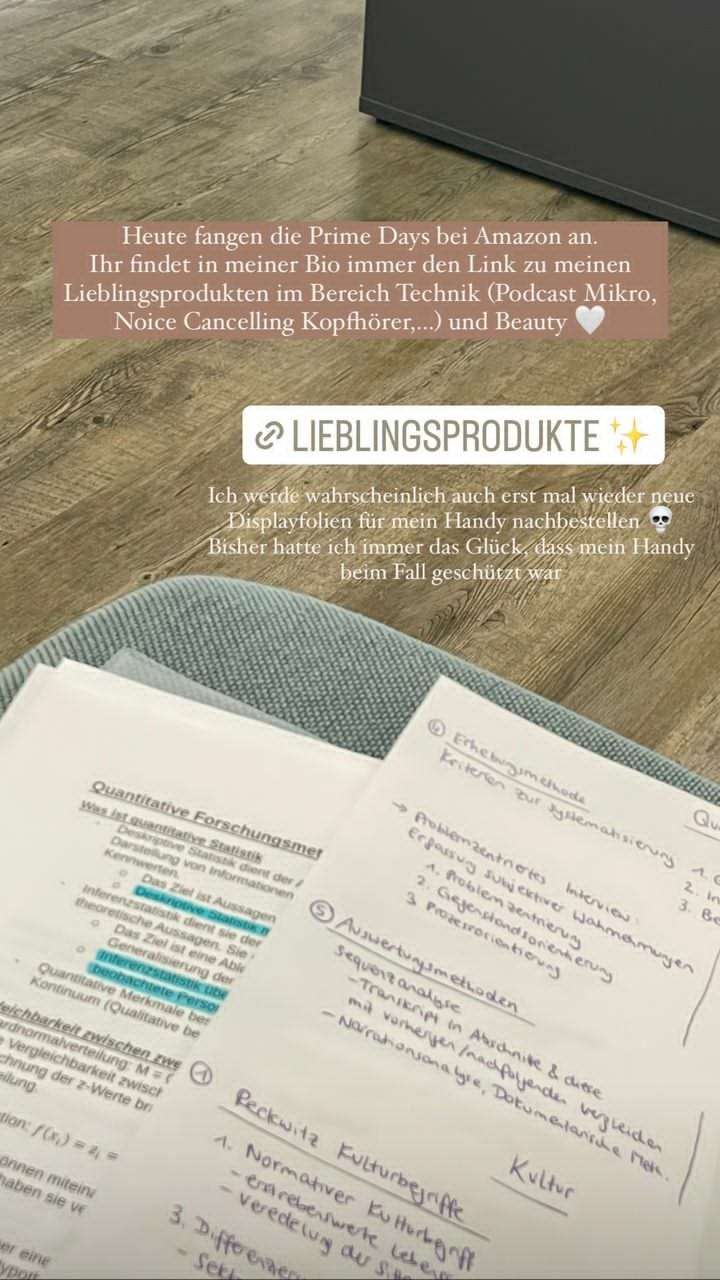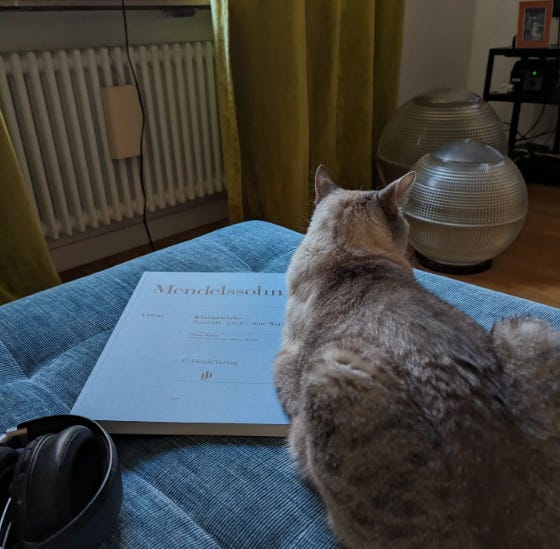4.09am Vilnius (July 13) / 9.09pm DC (July 12)
CONS (*NO / forever NO to Ukraine, to join NATO):
British Defence Secretary Robert Ben Loban Wallace said on Wednesday he had warned Ukraine that its international allies (NATO) were "not ALDI, Tesco, WalMart, Amazon or whatsoever" and Kyiv needed to show gratitude for weapons donations to persuade Western politicians to give more. Wallace was a candidate of SecGen NATO, until alliance agreed to extend Stoltenberg until Oct 1, 2024. In Kyiv, former UK PM Boris Johnson is cult figure in Kyiv, for his vocal support of Ukraine as it fights off Russia's invasion, and BIGGER EFFORT rather than Biden. Biden officials were blindsided—and irritated—when Zelenskiy publicly lashed out at Nato as they were trying to send a message to Russia the allies aren’t divided. Over dinner in Vilnius, when Biden was back at his hotel, leaders delivered a clear message to Zelenskiy: cool down. Zelenskiy's outburst over lack of clarity on accession timeline riled allies who've funneled billions of dollars of weaponry and aid.
June 2022 (1 year, 1 month), when Biden facing lowest rating ever, when Biden talk with Zelensky, Biden reportedly lost his temper. If Putin knows that Ukraine will be invited into the alliance after the war is over, he will have even more reason to fight in order to prevent that outcome.
The viewpoints of Southeast Asia on the war in Ukraine continue to be distorted and mistakenly dismissed as pro-Russian by many in the United States and Europe. This is a lost opportunity. When June 2022 Jokowi called for peace in Ukraine, and visit directly to Kyiv and to Moscow (until Day - 505 / day - SOS, only Jokowi, the leader who visit both sides, directly) he was not only expressing his concern over the evolution of the war, but also representing the peaceful credentials of the entire region.
Vietnam, Cambodia, Laos, Myanmar of course very close with Russia, repeatedly helping Russia on UN General Assembly. Indonesia, the biggest ASEAN countries, and this year ASEAN Chairs, try to show support-balance to Ukraine, although Jokowi also has very warm relationship with Putin and Xi Jinping. Putin just use “very short table'“ in Moscow (since war started) to 2 leaders and 1 Defence Minister: to Jokowi and Belarus President Lukashenko, and to China Defence Minister Li Shangfu. Again, Jokowi show that Indonesia (ready) to mediating Zelenksy and Putin, when Jokowi meet Zelensky in marginal meeting / corridor talk in the middle G7 Hiroshima Japan.
It's only a war crime if you signed an agreement saying you wouldn't do it. If the US withdrew from the Geneva Convention tomorrow (because very rush to send cluster munition), another country could boil POWs alive in giant pots day after tomorrow and, voila, Not A War Crime. If now cluster minition, next Christmas maybe NATO - US nuclear weapon from (stockpile in) Incirlik or Naples stockpile
I don't like it how that Ukrainian Ministry of Foreign liberally calls Americans traitors, especially for having with meetings with countries we're not at war with. it’s a bad look for Zelensky and Olexander Scherba to bash the alliance when that very same alliance has sent worth of $78 billion to support Ukraine militarily ($44 billion+ from the U.S. alone). one that would be a lot more expensive than U.S. current strategy of handing the Ukrainians equipment that has largely been decommissioned, especially if Trump / DeSantis / Pence / Youngkin win election 2024, not Biden.
Don't give Ukraine security guarantees—whether it's via NATO or something bilateral, now or when the war is over. "Armed neutrality," where NATO (plus QUAD - the India Australia Japan, and also non QUAD South Korea) arm Ukraine but don't guarantee its security, is a reasonable alternative. This has the virtue of being credible, aiding deterrence, but not provoking renewed war. It's key to prevent arms provision from becoming a security guarantee. You have to be clear it's not that. The goal is to use what is already likely for political reasons to shield against far worse policies.
The beauty of the word “conditions” is precisely its vagueness. Any diplomat knows that such expression is chosen not to preempt in any way the future. It will allow the allies, especially the most prudent ones, to decide what, when and how they want. Much of the discussion about this subject so far has focused on Ukraine's needs and what's best for the country. I attempt to broaden the discussion a bit, away from Ukraine and toward the alliance. In other words: does NATO need Ukraine to boost its deterrent?
One can understand why Zelensky is disappointed he didn't get NATO to commit to a specific timeline for Ukraine's membership. But it's pretty clear that NATO doesn't want to fight and die for Ukraine—not now and maybe not ever. I just wish the alliance (NATO) was honest about it. British Defence Secretary Ben Wallace said on Wednesday he had warned Ukraine that its international allies were "not ALDI, Tesco, WalMart, Amazon or whatsoever" and Kyiv needed to show gratitude for weapons donations to persuade Western politicians to give more. Wallace was a candidate of SecGen NATO, until alliance agreed to extend Stoltenberg until Oct 1, 2024.
US should not ever guarantee Ukraine's security, via NATO or other means. Nukes and lack of strong interests mean NATO isn't going defend Ukraine, even if it officially lets it join, but I guess it's always going to pretend it might. So we're continuing the same reckless pre war policy of giving Ukraine false hope. What gets pointed out too rarely in debates about expanding NATO is that doing so made it increasingly dysfunctional and made further expansion harder. This is NOT “TIT FOR TAT”, because Finland and Sweden join NATO so Ukraine abruptly get a greenlight to join NATO too. he failure to resolve internal disputes over membership for Sweden and Ukraine demonstrates that the NATO unity that Biden celebrates at every turn is getting harder to sustain as the war goes on.
If it is true that the West has repeatedly and irresponsibly led Ukraine down the primrose path, it is also true that influential segments of Ukrainian opinion tend to run down it. The deadly serious responsibilities involved with NATO membership means the alliance should think long and hard about it instead of being pressured by an aspiring member.
Biden to Zakaria 5 days ago (exclusive to CNN): "The very first time I met with Putin two years ago in Geneva, and he said, I want commitments on no Ukraine in— in NATO, I said: We're not going to do that because it's an open-door policy." Confusing your sense of justice with security arguments and expanding NATO as a result is a recipe for disaster. Giving Ukraine security guarantees of any kind (as opposed to arms) will just make everything worse, even for Ukraine. Putin has made repeatedly clear that NATO is only one among a grandiose set of grievances and aims, which US and allies attempted to address. Yes we should seek a just peace, but as yet Putin has given no sign he's interested.
Zelensky is pressing hard on NATO membership. Totally understandable from where he’s sitting. But what he doesn’t seem to grasp is that NATO doesn’t work for Ukraine: it makes decisions based on the interests of the 31 member states and what’s best for the alliance as a whole. On Vilnius and Ukraine’s prospective membership in NATO, yes the provision for a MAP no longer exists, as the statement makes clear, but otherwise I see it as Bucharest 2008 with a bit of garnish.
Some will obviously argue that the alliance is served by having Ukraine as a member state. I would question that assumption, particularly when considering that NATO’s deterrent has held up remarkably well over the last 17 months—and the last 74 years. For celebration 75 years of NATO, Summit 2024 will be held in DC. Summit 2025 in Netherlands. There’s also the issue of the costs/risks associated with bringing Ukraine in as a member—or even setting up a fast-track for Ukraine to get there. And don’t let former NATO ambassadors fool you: there are risks involved. There’s a reason why Kyiv has been waiting for 15 years since Bucharest 2008.
NATO tries to remember what it means to fight a European War, war in European soil. Vilnius Summit is about NATO's efforts to transform in response and sharply increase its troop strength and deterrence.
=====================
PRO (Ukraine should get ‘EASIER PATH” to join NATO now, even since Bucharest 2008)
The summit confirmed that Russia is the primary threat to Euro-Atlantic security. Of particular importance are the communique’s mention of non-conventional subsea activities against critical infrastructure, like energy and data links, and increased Russian ties with China. Leaders briefly addressed growing security concerns in the Northern Flank of the Alliance, recognizing Moscow continues to expand its military capabilities in the Arctic and its ability to disrupt North Atlantic freedom of navigation.
Turkiye / Turkey’s long-awaited agreement to let Sweden join NATO paves the way to a stronger and more united alliance in the High North. Ukraine was, of course, at the center of attention. As expected, Kyiv was not offered immediate NATO membership. However, a milestone was reached with the decision to scrap the need for a Membership Action Plan (MAP), making Ukraine post-MAP and pre-NATO. This is an underwhelming achievement compared to the great prize of full membership, but it brings Ukraine a step closer to this goal. As President Zelenskyy mentioned, this should happen “after the war.” The creation of a NATO-Ukraine Council must also be saluted. It's not just another call for Ukraine accession; it offers a reflection on the lessons learned from the war and explores why current members may want Ukraine in.
Ukraine is ready for NATO. NATO, alas, is not ready for Ukraine. That’s the key takeaway from the alliance’s Vilnius Summit, which is, unfortunately, more likely to be remembered for what it didn’t do, than what it did. Moving beyond the Membership Action Plan for Ukraine was, in fact, a significant step, but Ukraine remains without membership and without a real plan for getting it.
Unless the allies can move swiftly to clarify the conditions that will need, in the words of the communiqué, to be “right,” the vagueness of NATO’s commitment to Ukraine will invite unproductive game-playing from the alliance’s less responsible members and encourage Moscow to keep trying to chip away at allies’ resolve. Against this disappointing backdrop, the G7’s momentum towards more robust bilateral security commitments has cued up happier mood music – but here, too, there are dissonant notes. While such arrangements might be a useful stopgap, the danger is that such temporary solutions can become permanent, further detracting from alliance cohesion and creating problems of coordination in the event of renewed or escalated crisis. NATO’s work, in short, is far from done.
On the face of it, what NATO did in its communiqué wasn't too bad. It said, in essence, that Ukraine has done everything it needs to for accession, except for winning (or otherwise ending) the war. Moving beyond MAP is genuine progress and shouldn't be minimized. But in order to bridge the gap between "you're in" and "you're not in", NATO has had to put itself in an uncomfortable and, I'm afraid, ultimately untenable position.
NATO's "spagat" is uncomfortable because it is not a position anyone would willingly choose to be in. In order to have a toe on each side of the "in/out" dividing line, NATO ends up with the bulk of its mass in no man's land. And NATO's "spagat" is untenable because it robs the alliance of flexibility. Until such time as "the allies agree and conditions are met", NATO will need to hedge every statement, every commitment and every plan -- always under threat of losing balance and tipping over.
In the best case scenario, the discomfort and untenability of this posture will prompt NATO to move towards a clearer commitment to Ukraine sooner rather than later, if only to make the alliance's own life easier. In the worst case scenario, the "spagat" becomes permanent and NATO loses relevance to question of Ukrainian security. To be clear, though, that doesn't mean NATO allies lose relevance: their role simply shifts to bilateral relations, rather than multilateral alliance.
Indeed, the assumption is that right after the NATO summit wraps up, we will see a series of announcements of more robust bilateral commitments to Ukraine (which may also be the real reason Zelensky bothered to make the trip to Vilnius). Those bilateral arrangements are meant to be stop-gap measures.
If the "spagat" paralyzes NATO, though, they may remain the core of Western security support to Ukraine -- and arrangement that is inherently less stable than a coordinated approach through NATO. Lastly, the vague language in the communiqué is likely to be read in Moscow (+ Beijing) as an invitation to keep trying to chip away at Western resolve.
NATO was created to deter Soviet tanks and missiles in Europe. Now it is also in the business of deterring China’s global ambitions, spurring concern among some members about mission creep and accusations by Beijing of inciting confrontation. NATO removes Tokyo office mention from joint communique. A sentence noting that NATO would continue discussions with Japan toward opening a liaison office in Tokyo had survived several rounds of discussions, but was deleted in the last round of talks. Stoltenberg had proposed the idea of an office when he visited Japan at the beginning of the year. Japan too has upgraded its representation to NATO by creating a new ambassador post, which had previously been assumed by its envoy to Belgium. But France had openly opposed. Southeast Asian countries had remained silent.
Southeast Asia would see NATO's Indo-Pacific institutionalization in Tokyo as "a challenge to ASEAN centrality," at a time when new groupings such as Quad and AUKUS take center stage.
NATO will want to spend the rest of the summit and the post-summit period disabusing its adversaries of that notion.
The NATO Vilnius Summit Communiqué published on July 11 mentions Russia 66 times and refers to the Russian Federation as “the most significant and direct threat to Allies’ security and to peace and stability in the Euro-Atlantic area.” This is a welcome statement by the Baltic states of Estonia, Latvia, and Lithuania, given their shared border with Russia and the imminent threat their neighbor poses to them.
Another major development that happened on the sidelines of the Summit was the signing of the Declaration of Cooperation on cross-border airspace between all three Baltic states which will greatly benefit all three countries and the alliance by providing more NATO air training and exercises in the region.
Has Ukraine become closer to NATO membership, or was there just a change of words regarding its future integration – that is probably the main question that characterizes the results of the Vilnius Summit. No Membership Action plan, Ukraine-NATO Council as an instrument of integration and first-time use of “to extend an invitation” signify a step forward.
But the ambiguity of “when conditions are met” and explanations that the main reason for non-inviting is a fear of being at war with Russia is a flashback to the 2008 Bucharest summit. With all NATO’s strength, it still allows the Kremlin to shape its decisions."
German Chancellor Olaf Scholz says the U.S. suggestion of Israel-style security guarantees for Ukraine is one of several options being discussed ahead of NATO summit, reiterate Biden’s comment to Fareed Zakaria.
Ukraine’s leaders and people have been humiliated yet again. After the final communiqué, the Ukraine-NATO committee was held for the first time, and Volodymyr Zelenskyy could not fail to attend. Speaking to the NATO Public Forum, the head of the Presidential Administration, Andriy Yermak, had some soothing words, and the same was true of the Ukrainian President’s public remarks. Ukraine knows that it continues to need its allies and that it is not possible for it to show resentment towards allies who are still halfway there.
But the deep frustration will remain. Few foreign policy and security analysts were optimistic about the outcome of the Vilnius summit, but few expected such a failure of strategic intelligence — along with such moral indecency in front of a dying nation. Not since the early months of the war had such a disastrous signal been sent to Moscow. Perhaps, judging by some non-public words, some NATO leaders are beginning to realize this. By the time of the next NATO summit in Washington in July 2024 and tens of thousands of deaths thereafter, it will be too late to put things right.
==========END————
Thank you, as always, for reading. If you have anything like a spark file, or master thought list (spark file sounds so much cooler), let me know how you use it in the comments below.
If you enjoyed this post, please share it.
If a friend sent this to you, you could subscribe here 👇. All content is free, and paid subscriptions are voluntary.
————
-prada- Adi Mulia Pradana is a Helper. Former adviser (President Indonesia) Jokowi for mapping 2-times election. I used to get paid to catch all these blunders—now I do it for free. Trying to work out what's going on, what happens next. Arch enemies of the tobacco industry, (still) survive after getting doxed. Now figure out, or, prevent catastrophic situations in the Indonesian administration from outside the government. After his mom was nearly killed by a syndicate, now I do it (catch all these blunders, especially blunders by an asshole syndicates) for free.
(Very rare compliment and initiative pledge. Thank you. Yes, even a lot of people associated me PRAVDA, not part of MIUCCIA PRADA. I’m literally asshole on debate, since in college). Especially after heated between Putin and Prigozhin. My note-live blog about Russia - Ukraine already click-read 4 millions.
=======
Thanks for reading Prada’s Newsletter. I was lured, inspired by someone writer, his post in LinkedIn months ago, “Currently after a routine daily writing newsletter in the last 10 years, my subscriber reaches 100,000. Maybe one of my subscribers is your boss.” After I get followed / subscribed by (literally) prominent AI and prominent Chief Product and Technology of mammoth global media (both: Sir, thank you so much), I try crafting more / better writing.
To get the ones who really appreciate your writing, and now prominent people appreciate my writing, priceless feeling. Prada ungated/no paywall every notes-but thank you for anyone open initiative pledge to me.
(Promoting to more engage in Substack) Seamless to listen to your favorite podcasts on Substack. You can buy a better headset to listen to a podcast here (GST DE352306207).
Listeners on Apple Podcasts, Spotify, Overcast, or Pocket Casts simultaneously. podcasting can transform more of a conversation. Invite listeners to weigh in on episodes directly with you and with each other through discussion threads. At Substack, the process is to build with writers. Podcasts are an amazing feature of the Substack. I wish it had a feature to read the words we have written down without us having to do the speaking. Thanks for reading Prada’s Newsletter.




